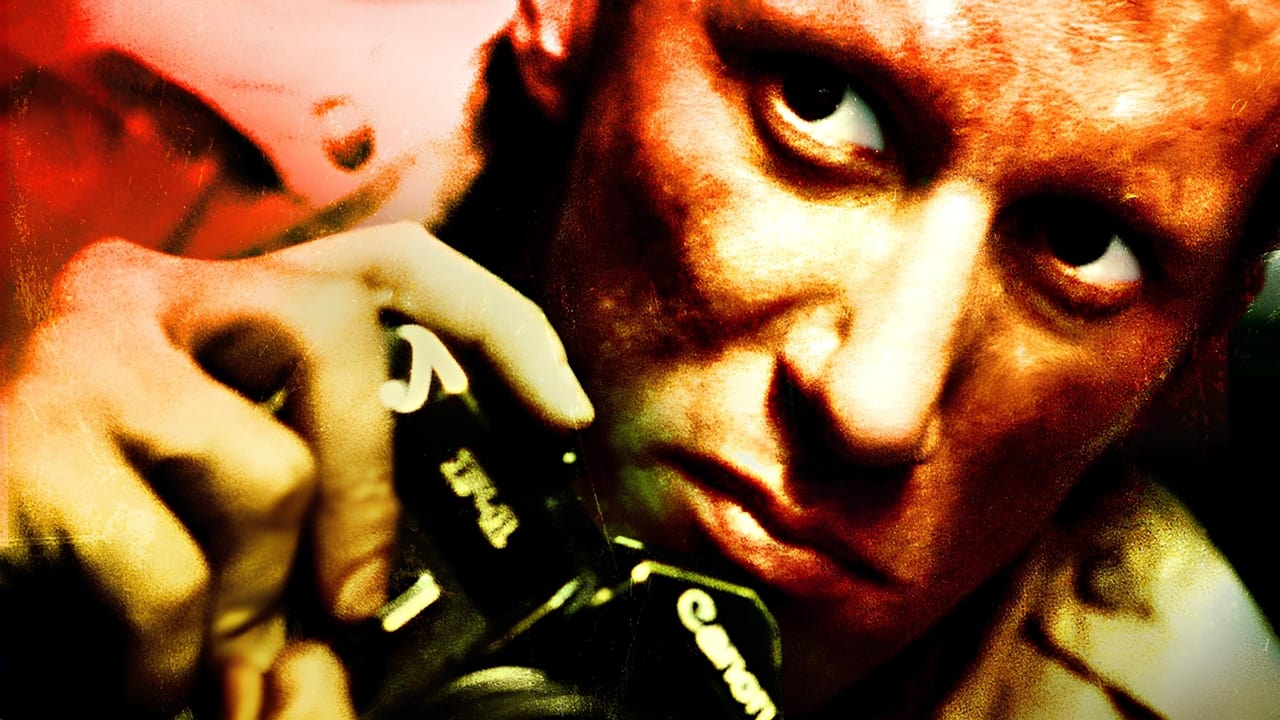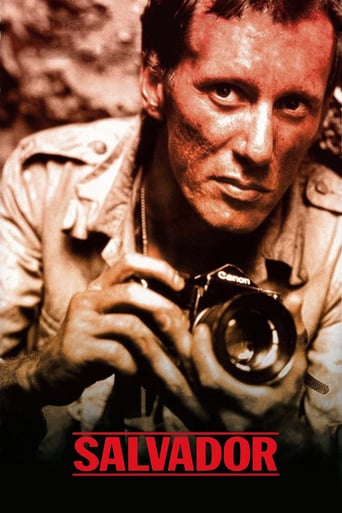Matialth
Good concept, poorly executed.
GarnettTeenage
The film was still a fun one that will make you laugh and have you leaving the theater feeling like you just stole something valuable and got away with it.
Sameer Callahan
It really made me laugh, but for some moments I was tearing up because I could relate so much.
Casey Duggan
It’s sentimental, ridiculously long and only occasionally funny
namashi_1
Oliver Stone is a Legend. He has made remarkable films throughout his career and I have been his biggest fan since ages. 'Salvador' is a yet another winner from this legendary storyteller! 'Salvador' takes place in 1980, where a sleazy war photo-journalist Richard Boyle, played by James Woods, goes to cover the bloody civil-war happening in El Salvador. His journey is full of bloodshed. He goes to cover this war, which he begins to hate. He not only loses hope in himself, but also loses his soul. Oliver Stone handles this gritty & gruesome journey with effortless ease. In each & every shot, the director understands the subject & executes each detail superbly. Screenplay by Richard Boyle himself & Stone is in sink with the structure of the film throughout.Performance-Wise: James Woods is Terrific. He is the soul of the film. Jim Belushi is damn good. Michael Murphy is effective. John Savage leaves a mark. Others lend good support. On the whole, A Must Watch!
ian_bell
Salvador was made at the height of Reaganism in the 1980s, and depicts events in that country in the early 80s through the eyes of Richard Boyle, an American journalist.Boyle is a walking disaster at the start of the film. It opens in San Francisco (I think), where Boyle has been dumped by his girlfriend, given an ultimatum by his boss, and then pulled over by the police for driving an illegal car.The man is on borrowed time, and when he and friend Dr Rock hear of the tempting life on offer in Central America (cheap drugs, cheap booze, and easy women) they head for El Salvador.Taking the film by the scruff of its neck, Stone drags this movie, kicking and screaming towards its ferocious climax.We watch Boyle (a mesmerising James Woods) undergo something of a Damscus-like conversion as his hedonistic approach to life gives way to mounting fury as he sees first his new girlfriend's brother all but beaten to death, then one of his closest friends face an even greater threat as it becomes apparent the ruling force (a right-wing militia backed by US money) is rapidly destroying the country from within.I notice some of the comments on IMDb seem to take issue with Stone's style of film directing, in short accusing him of preaching. In defence of him, ask yourselves this: how many other US film directors would even consider making a film like this? Quentin Tarantino perhaps? Maybe John McTiernan? What about Ron Howard or Steven Spielberg? Let's be honest, most of them would be too afraid of harming their careers by launching such an all-out offensive on the very nation which gives them such a privileged lifestyle. I'd probably be the same if I had their talent: play safe and get rich.But that is exactly what makes an Oliver Stone film so special. Stone has probably never made a 'safe' film in his life, and I doubt he ever will.El Salvador is perhaps the greatest film of a career which may yet have some more to say. The picture crackles with the energy of a director who is afloat on sheer passion and righteous fury.
michaelhennessy8
As jobbing photojournalist Richard Boyle (James Woods) and his friend Dr. Rock (James Belushi) guzzle booze and drugs in a red convertible on their journey south of the border, you'd be forgiven for thinking you were watching a sort of Fear and Loathing in El Salvador. But where Hunter S. Thompson journeys into the heart of the American Dream, Oliver Stone's semi-biographical thriller explores its outward reach as franchiser to the Third World. What emerges is an exposé of the superpower's influence in creating a late-twentieth-century Heart of Darkness.No sooner do Boyle and Dr. Rock settle into the roles of the partying gringos than they find rifles pointed at them at a military roadblock. 'Whatever you do Doc', warns Boyle, 'don't get on the ground.' The first in a series of tense, sweaty set-pieces, Boyle must defuse the situation, armed only with a couple of knock-off watches and his oily charm. It is in these scenes of forced laughter with grave locals that the self-confessed 'weasel' Boyle excels; his defining characteristic appears to be his knack for self-preservation. It is a role perfectly suited to its star: no one balances sleaze with intensity quite like James Woods.Leeching and lying his way through encounters with acquaintances and enemies, Boyle is a strange, flawed protagonist. He lacks the maverick talent traditionally bestowed on the anti-hero, which is here embodied in old friend John Cassady (John Savage), a photojournalist fiercely committed to the ideal of the world-changing shot. But as Boyle bears witness to the atrocities committed and hypocrisies inherent in the country's Civil War, he becomes more impassioned with every picture he takes. Where he is initially concerned with staying off of the dreaded ground, he grows to stand up for those who are stuck there.Stone shoots the movie much like a war-photographer, capturing the atrocities as an outsider, and wisely reigns in the visual excess that would come to define much of his nineties work. 'Gotta get close to get the truth', Cassady intones as he climbs over a mound of corpses, 'You get too close, you die'. Stone's camera stays eye-level with his protagonist, casting from above the American gaze over a people who live on their knees, or else are strewn lifelessly across the landscape.Behind the brutal military regime that tries to suppress the (equally brutal) peasant guerrillas sits the U.S. government. Their presence as 'advisors' lends a sense of futility to the battle-scenes: no matter how bravely or well each side fights, Stone suggests, the outcome will ultimately be decided amongst Americans in an office far removed from the battlefield. Boyle professes his patriotism in a climactic speech that fails to convince, in spite of Woods' best efforts; channelling the outspoken Stone himself, he reserves his most damning accusations for the government of his homeland.Despite slipping into the preachy and manipulative at times- a distressing scene involving a group of nuns is particularly heavy-handed, regardless of whether it is based in fact- this is an effective, tense thriller, with some interesting contemplations of journalistic and political responsibility. As much character piece as polemic, Salvador is highly recommended, for Woods' wired performance in particular.
Robert J. Maxwell
Journalist Rick Boyle's life in San Francisco is a mess. He's broke, married to an Italian woman with a child, and -- deserted by them -- talks a gullible disk jockey friend into driving with him in his clunker down to El Salvador. It's a jolly ride at first, a little like "Fear and Loathing in Las Vegas." Boyle is aptly played by the tic-ridden James Woods and his companion by James Belushi. They have a lot of fun driving through Mexico stoned and drunk in their convertible.In Salvador, things take a more serious turn and end tragically. Woods' character takes us on a political tour of the grungy capitol city with its cervezarias and its whores and its dope and its thugs and its jails. We meet the American-supported right-wing dictator who blames all the unrest on the commies. The guy is running death squads, and when one of them murders an outspoken populist priest, the Army immediately arrest an innocent bystander.There is one of those sexy, blond, camera-ready reporters who swallows every lie she's fed by the government and the CIA about the nasty rebels and the unblemished dictator. There is the American military adviser lashing out against the KGB infiltrators who will work their way up from Central America to the Rio Grande. And there is the American ambassador, Michael Murphy, a naive, well-intentioned man who turns first one way then another in his support for the brutal Hefe.The story was co-written by Rick Boyle. He seems to know what he's talking about -- the bribes, the mindless police harassment, and the mountain of dead bodies in the official dumping ground. But it's not really much of a documentary, not if you take "documentary" to mean something like an objective portrait of a given historical moment.Boyle's and Stone's opinions keep popping up. The dictatorship is absolutely wrong. The independent and ineffectively armed rebels are right to fight against it, but the suggestion is that, once in power, they'll become equally ruthless. In a too-long harangue, Woods tells the audience -- I mean his two companions -- that "left-wing" is not the same as "communist", but Americans keep getting them mixed up. He himself, he proclaims, is a patriot, a true American who has seen war before in Vietnam, Cambodia, and elsewhere, and believes it's wrong for the US to stick its armed support and covert assistance into complicated situations that aren't understood. We can't support just ANYBODY simply because he's not a communist.Those prejudices happen to be concordant with my own, but I rebuff sermons from any source. It would have been a better movie if Woods had kept his pie hole closed, if Stone had just SHOWN us Woods' feelings without his having to spell them out as if to a grade school class. However, maybe some viewers needed the message in bold print and, in any case, nobody ever stopped Stone from giving a lecture.Agreeable acting, for the most part. Woods, of course, could hardly fit the role of the reckless manic better. Belushi doesn't have much of a part. That's just as well because the character is a little mushy and appears only sporadically in the second half of the film. Elpidia Carrillo may or may not be a familiar name but people are likely to recognize her face from other appearances. It was generous of the director to give us a brief nude scene. I'd never realized how saucy her bottom was. Cynthia Gibb appears as a cheerful aid or nurse from some charitable organization. She's cute as all get out. No nude scene, though, and when she is raped and murdered along with some nuns, in a scene based on a real incident, it's shocking and painful. How, one asks, is it possible for any man to rape a nun? What kind of man could rape ANY woman? The film isn't without its humorous moments. Aside from Woods and Belushi tooling along in that beat-up Mustang, there is Woods in the confessional for the first time in 33 years. He wants to marry Carrillo and, in the course of doing so, commit bigamy, and Carrillo won't go along with it unless he receives absolution and takes communion first. (It only costs him one Our Father and twelve Hail Marys and an Act of Contrition. Sin seems to be the only thing the price of which has not skyrocketed over the years.) This is one of Stone's more amateurish but less indulgent movies. There's a plot, more or less, some character development, and mostly it rings true. It would be nice if were always able to keep at least one foot in reality and if he were to stop driving everyone crazy with his directorial furbelows.

